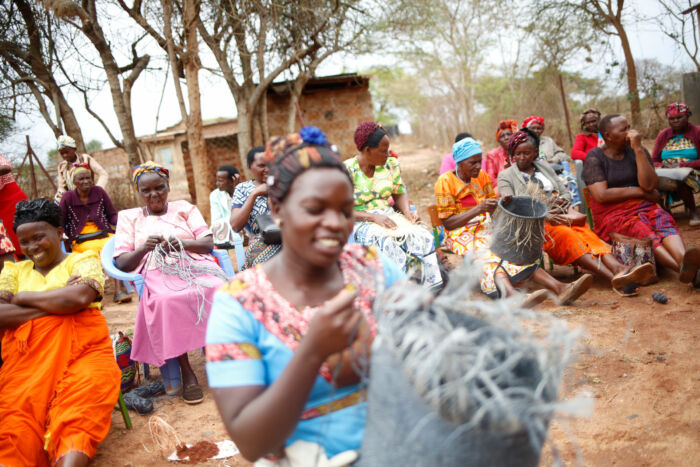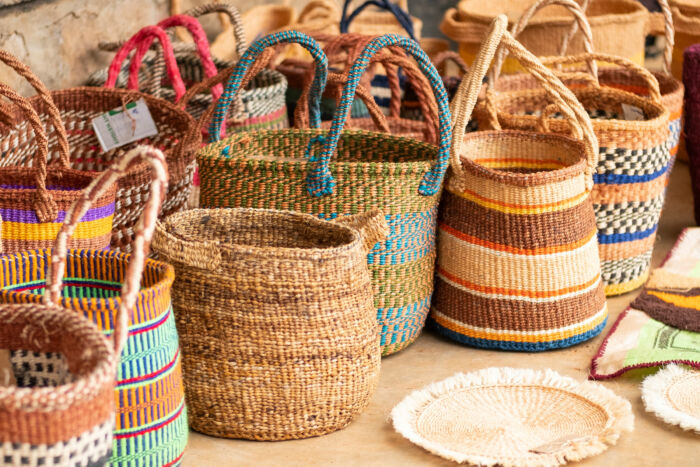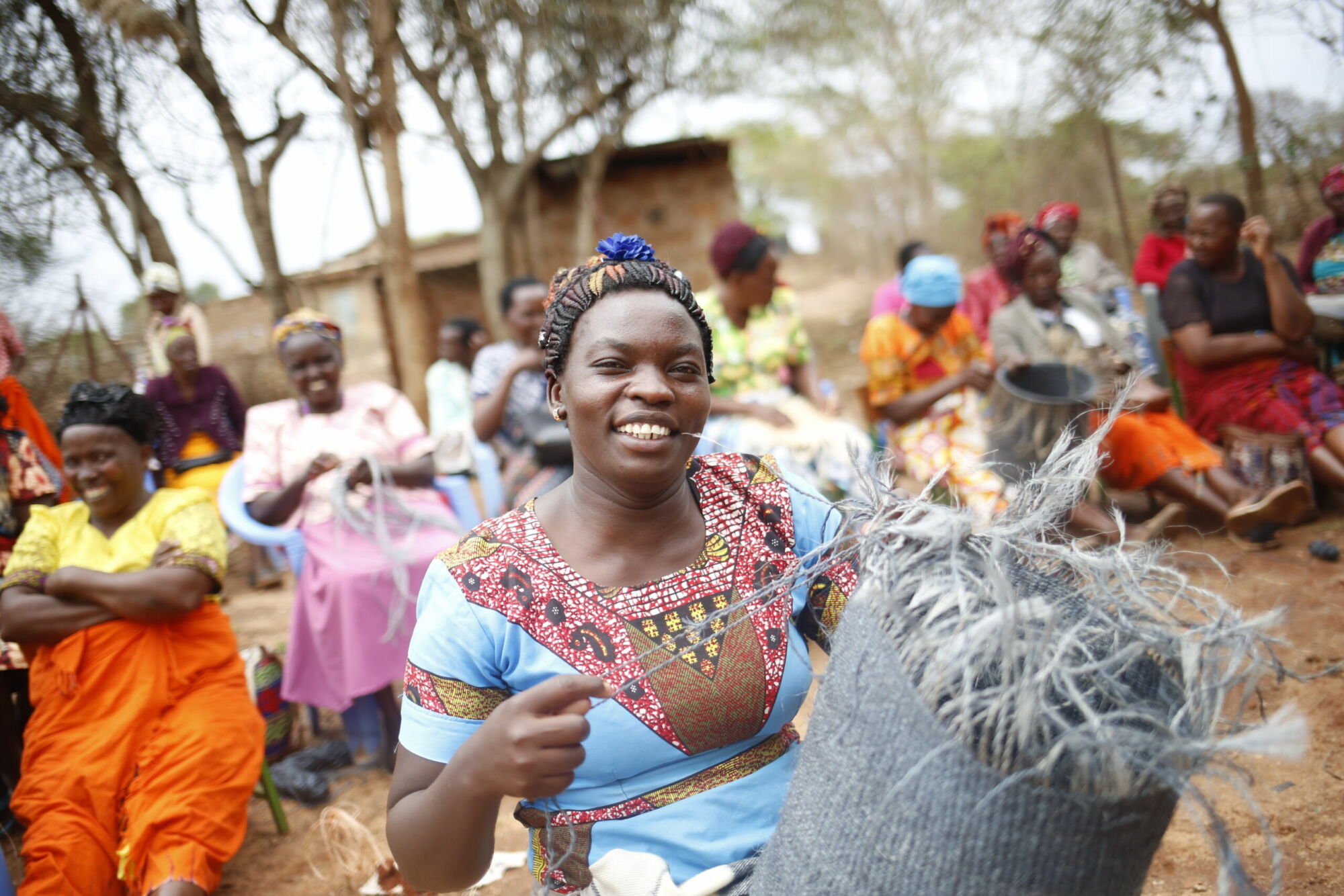
Kiseseni, located in Machakos County, Kenya, bears witness to the harsh reality of climate change-induced drought. The barren trees and dry soil serve as a stark reminder of the absence of rainfall for several months, erasing any recollection of when it last rained.
Inside a classroom at the Kiseseni Early Childhood Development (ECD) Center, a group of women has gathered. Their focus is on sisal basketry and exploring ways to save and empower themselves and their families.
This group, known as the Kikuthuko Women’s Group, began in 1992 as a women’s basketry group with aim to collectively produce sisal baskets in various styles. The handmade baskets are crafted from sisal fiber, which the women dye in a variety of colors to make stunning baskets.
They are sold through the Machakos Cooperative Union (MCU) to international markets in Japan, Canada, Italy, and Germany. Presently, the group consists of 750 members, drawn from twenty-five smaller groups, each comprising 30 members.
The persistent drought has compelled smallholder farmers to diversify their income sources, leading women to engage in basket making as an innovative initiative to improve their livelihoods beyond sole reliance on farming.
To supplement their income, group members have formed Village Savings Loans Associations (VSLAs), where regular contributions are made.
VSLAs offer flexible, low-interest loans supported by a peer guarantee system. At the end of each year, the savings and interest are shared out as dividends, fostering a savings culture and establishing a fund for low-interest rate loans when members require amounts beyond their individual savings.
Some women have used these loans to purchase water tanks, goats, and even to roof their houses. In most households led or managed by women, the borrowed funds are primarily allocated to pay for their children’s school fees, food purchases, and establishing small businesses. A majority of members have established small retail businesses in the nearby shopping center, allowing them to save through the VSLA. Additional income comes from the sale of sisal threads.
Juliana Komu shares her story, revealing how her husband initially opposed her joining the savings group, fearing her increased financial empowerment. However, she secretly joined and, after receiving dividends, surprised him by purchasing three cows. This turn of events altered his perception of the women’s savings group, and he now supports her contributions. The dividends have also contributed to the roofing of their house.
Florence Nguma and other members have invested their dividends by buying plots within the Kiseseni shopping center, transforming it into a women-owned small town. Other members have reinvested their earnings or made personal investments.

The impact of the savings groups as a coping mechanism against the adverse effects of drought in the area is immense. Florence Muli, another member of the Kikuthuko women’s group, attests to this. She has greatly benefited from the savings group, borrowing funds to establish a kitchen garden at her home. Here, she cultivates vegetables and tree seedlings for personal consumption and sale to neighbors, schools, and churches—an environmentally conscious effort on her part.
VSLAs prove to be an excellent empowerment tool for women in this region, offering credit to impoverished rural women and smallholder farmers by leveraging pooled savings as lending funds.
During the dry season, when men are often away for extended periods in the city, women can access loans for school fees and other essential expenses. Jacqueline Mbula mentions the days they slept hungry during drought. However, the savings group has transformed their lives, providing a safety net amidst challenging economic times. She shares her joy in purchasing goats and poultry, ensuring food security for her family and reinvesting in the group.

Muiya Muendo proudly displays her stunning baskets. Photo: Catherine Waking’a

We Effect Support
We Effect, in partnership with Swedish Radio Aid and Ronnie Letten through Epiroc Water for all, has supported the community due to the success of the sisal basket weaving initiative. Our support has facilitated the establishment of an Early Childhood Development and Education (ECDE) center and a 160-meter water borehole that serves the community, two local schools, and a dispensary.
The ECDE center enables children to develop literacy and math skills through play, reducing the distances they need to walk to access basic education.
The borehole has alleviated the time spent fetching water and lowered the prevalence of water-borne illnesses in the area. However, the high cost of electricity remains a challenge, prompting the women to seek solar panels to reduce pumping costs.
Looking ahead, the women have joined hands with other weaving groups in Machakos and formed the Lower Eastern Women Cooperative Society Limited (LEWOCO).
About LEWOCO
LEWOCO is a women-led cooperative society promoted by the Machakos Cooperative Union (MCU) and was officially registered on August 1, 2022. Affiliated with MCU, its goal is to promote the economic welfare of its members and initiate food security projects that ensure women and young people have access to sufficient food. LEWOCO primarily targets individuals closely involved with MCU who rely on weaving and curio making for their livelihoods. The cooperative was established in recognition of the absence of women-led cooperatives dedicated to advancing the socio-economic welfare of women within the Machakos region.
